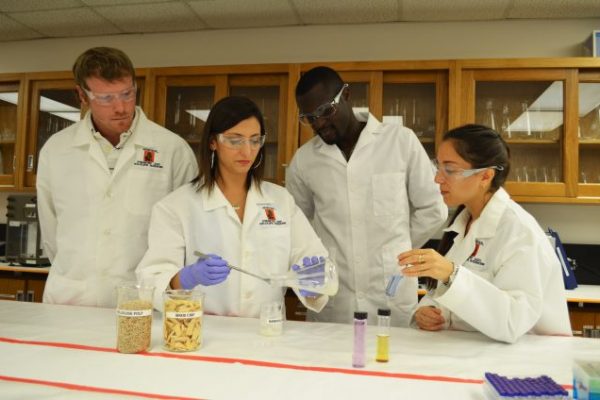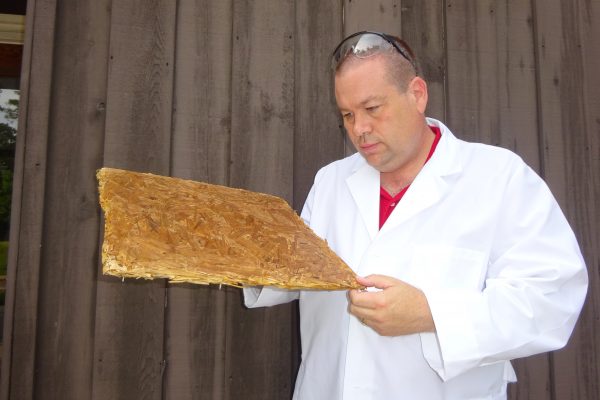Alabama’s forest production and processing industry contributes nearly $21 billion to the state’s economy and positions it to be a leader in the development of a sustainable bio-based economy that includes wood processing, construction, chemicals and energy, bioplastics, and packaging. With several other wood related industries on the horizon, its impact on the state’s economy is expected to increase.
In addition to the positive economic indicators evidenced by the increases in wood pellet consumption and demand for biodegradable wood-based packaging, the use of cross-laminated timber (CLT), a newly engineered wood product system, in mid- and high-rise residential and non-residential construction is also growing.
CLT features a unique layered engineering which gives it steel-like strength, and it’s light, easy to assemble, sustainable, fire resistant and cost effective; making it ideal for commercial construction. CLT offers the structural simplicity needed for cost-effective buildings, as well as benefits such as fast installation, reduced waste, improved thermal performance, and design versatility.
Because of its high strength and dimensional stability, it can be used as an alternative to concrete, masonry and steel in many building types. Due to its performance compared to conventional materials, CLT is also gaining in popularity among residential builders. As a result, a major company recently announced that it will invest nearly $20 million to open the first commercial CLT manufacturing plant near Dothan to produce innovative timber panels and beams using Southern Pine lumber.
The School of Forestry and Wildlife Sciences’ Forest Products Development Center, or FPDC, research program seeks to characterize, define and provide processing or new product solutions that are environmentally friendly and utilize natural resources. They also strive to address wood quality issues for bio-based product manufacturers, forestry and renewable natural resource managers, and timber management companies in the southern U.S.
Brian Via, Regions Bank Professor and director of the FPDC, studies chemometric modeling of biomaterials, forest or plant tissue for chemistry and quality, and the development of sustainable adhesives, fillers, substitutes for wood composites.
Auburn faculty from the School of Forestry and Wildlife Sciences, the Samuel Ginn College of Engineering, and the College of Agriculture have been awarded a grant from the Agriculture and Food Research Initiative Foundation’s National Institute of Food and Agriculture (NIFA) Bioprocessing and Bioengineering program to develop a practical method to utilize hydrothermal liquefied lignin (HTL) as a renewable phenol to improve crosslinking or curing of epoxy adhesives.
The research team proposes to utilize this bio-oil to bond with the wood substrate to avoid leaching and to make the overall composite more water resistant and thus increase its use and applications. The goal is to develop a water resistant wood composite that features improved mechanical properties suitable for engineered construction, particularly under wet conditions. Such an innovation would greatly increase revenues and potentially jobs since it would create another value-added product from wood for use with epoxies for exterior wood construction markets.
As part of the inaugural cycle of Auburn University’s Cluster Hire Initiative to create the Institute for Scalable Energy Conversion Science and Technology, the School of Forestry and Wildlife Sciences hired Assistant Professor in Bioenergy and Bioproducts Maria Soledad Peresin to join the school’s Forest Products Development Center.
Peresin supports the research initiatives of the institute to explore alternative uses of biomass. Her research focuses on the development of value added materials from renewable biomass for novel applications, surface chemistry and interactions of plant cell wall components, with an emphasis on nanocellulose.
Obtained from wood and non-wood biomass, nanocellulose is a non-toxic, biodegradable and renewable material with very unique characteristics with potential for many uses, including pharmaceutical applications. This versatile nanomaterial is being considered as a new system for human drug delivery to replace existing carriers which may be less desirable or effective. Researchers are studying nanocellulose as a biodegradable drug delivery mechanism and will soon begin product testing for pharmaceutical use.
The FPDC is presently testing nanocellulose as an alternative and bio-based encapsulating agent for vitamins and micronutrients. They have successfully tested its use for B-complex vitamins.
“Our faculty are cutting-edge in terms of forestry enterprise and product innovation,” said School of Forestry and Wildlife Sciences Dean Janaki Alavalapati. “In addition to this important research, our efforts to develop leaders to serve these industries will assure the sustainability and growth of Alabama’s economy, both in timber sales and employment.”
These developments are increasing the demand for professionals with diverse expertise in biomass production and operational logistics; conversion processes of products and packaging; and product development, sustainability and business.
To meet this need, the School of Forestry and Wildlife Sciences in collaboration with the Colleges of Agriculture, Engineering, Business and Architecture, Design, and Construction has developed a new undergraduate degree program in Sustainable Biomaterials and Packaging.
One of the only programs of its kind in the Southeast, this interdisciplinary program will provide students with knowledge, expertise, and hands-on experience to prepare them for lucrative careers in the emerging bio-based industry that seeks more sustainable and economical alternatives to a petroleum based market.
Pending approval by the Alabama Commission on Higher Education, it is anticipated the new degree will begin enrollment in the fall 2018.











